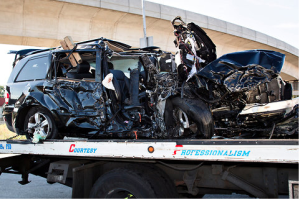Licenced to Kill?

With the ex- President of Academic Staff Union of Universities, Prof. Festus Iyayi, becoming the latest victim of dangerous driving and disregard for traffic rules, a habit common among elected public officials, Chineme Okafor writes on the abnormality that has become the norm in Nigeria
To be elected as a public official in Nigeria nowadays seems a licence for impunity. For instance, dangerous driving has become a common place on Nigerian roads with elected public officials’ convoy responsible for several auto accidents and deaths in recent times.
Yes, dangerous driving elsewhere attract imprisonment and fine, but in Nigeria elected officials and government appointees brazenly drive dangerously without being charged for their reckless act. Indeed, receiving a dangerous driving charge is one of the most serious motoring offences all over the world.
The death exactly last week of a one-time President of the Academic Staff Union of Universities (ASUU), Prof. Festus Iyayi in a grisly auto accident that also involved an alleged convoy of the Governor of Kogi State, Idris Wada has again brought to the fore reckless driving that is associated with convoys elected officials on Nigerian roads.
The grotesque display of force by motorcades of most Nigerian government officials on public roads has claimed more lives as can be imagined through utter lack of discipline on road usage by drivers of these government officials. The rate of road accidents involving convoys of top government
officials has grown to largely contribute to Nigeria’s unenviable record of the country as having the second highest road traffic accident fatalities in the world which statistics from the World Health Organisation (WHO) puts at 162 deaths per 100,000km. Isn’t it ironical that the same government that makes laws including road traffic laws and laws guiding public conduct will eventually end up flouting these
laws?
From the small local government officials to states and indeed the federal governments, tales of accidents obviously caused by excessive speeding of government convoys on roads that are deplorable owing to their reluctance to fix them abound everywhere around the country.
Although opaque, records indicate that Nigerians have steadily lost their lives to road accidents involving mostly convoys of state governors with display of executive power on poorly maintained roads.
Undeniably such government recklessness seems to have recently found its abode in Kogi State where the state governor has been described by the Nigeria Labour Congress (NLC) as someone that is fast acquiring the ugly reputation of “accident-prone governor.”
To be sure, between December 28, 2012 and November 12, 2013, Wada has had two auto accidents involving his convoy, in which one of the auto crashes nearly claimed his own life. In December 2012, the governor was lucky to escape a crash along the Lokoja-Ajaokuta Road with a fracture which kept him away from work for a while, but his Aide-de-Camp (ADC), Idris Mohammed, an Assistant Superintendent of Police (ASP) was not so lucky. Mohammed died on the spot. While moving from an official function at Ayingba to another one in Lokoja the same day, Wada’s convoy which it was believed to have engaged in excessive speeding to meet up with the latter event was involved in the accident. And a few days after that, the Speaker of the state’s House of Assembly, Momoh Lawal was also involved in another horrible accident that killed a police corporal, Lamidi Akeem, attached to his convoy.
And yet again, on November 12, the same convoy in which Wada was driving was involved in a crash along the Lokoja-Abuja Expressway that killed Iyayi who was on his way to Kano to attend the National Executive
Committee meeting of ASUU that was supposed to take decision on the direction of its four months old strike.
Like Kogi, a similar incident occurred in Imo State a few days before January 2013, when the convoys of the state governor, Rochas Okorocha and that of Senator Chris Anyanwu who represents the state in the Senate rammed into each other. While no life was lost in the incident, aides of the two officials however engaged themselves in a free-for-all fight.
The convoys of Gombe State governor, Ibrahim Dankwambo and Deputy Governor of Niger state, Ahmed Musa Ibeto were separately involved in road crashes on January 18 and 20, this year for the same practices of reckless driving on highways.
While Dankwambo’s convoy crashed on the Gombe-Yola road when the driver of a pickup van lost control at a sharp bend and hit a police van in the motorcade returning from a constituency tour in Shongom Local Government Area at about 9.15pm, it equally caused the death of one person with six others sustained various degree injuries.
The crash involving Ibeto killed two people on a motorcycle while he made his way to Kalgara area of the state for the final ceremony of the state’s
Qur’anic competition. His convoy had reportedly rammed into the motorcyclist who was said to be on the opposite direction.
From 2012 till date, the number of accidents involving convoys of state governors has continued to increase starting with that of Governors Adams Oshiomole of Edo state; Tanko Al-Makura of Nasarawa State; Abdul Aziz Yari of Zamfara State and indeed the late Patrick Yakowa of Kaduna State, all of which had claimed lives in the process.
The accident that involved Oshiomhole’s convoy in 2012 had claimed the lives of three journalists namely Olatunji Jacobs, George Okosun both of Independent Television (ITV) Benin City and Fidelis Ohani of African Independent Television (AIT) as well as a driver attached to them. It occurred when the governor’s back-up vehicle, conveying security personnel and the press bus for reporters at the government house collided with an heavy duty vehicle on the Afuze-Auchi road in the state.
Three aides of Al-Makura including his personal assistant, police officer and a driver were killed in a similar crash, while several others, including his son, Karu, sustained injuries. That of Yari involved his convoy colliding with a camel at Talata Mafara, after a road inspection visit to Gummi area of the state. The accident claimed the life of the head of his special protection unit, Ado Yahaya, while five other policemen sustained injuries. The late Yakowa also had a vehicle in his convoy that killed a roadside orange seller due to excessive speeding last November.
As Nigerian public officials appear to have acquired every licence to kill on roads around the country that they fail to maintain, the list however remains stretched taking into consideration the frequency of such crash from their reckless driving habits. Going back into the immediate past, one will also recall that the practice of reckless driving by convoys of public officers has gone on without efforts to curb same. It readily comes to mind that the former Deputy Governor of Gombe State, David Albashi who was involved in similar
crash did not survive as he died in a German hospital. The convoy of a one-time governor of Ogun State, Gbenga Daniel had in 2005 claimed the lives of five journalists while that of the then Niger State Governor, Abdulkadir Kure in 2007 saw to the death of six of his aides and that of former Plateau State governor, Joshua Dariye also in 2007 claimed nine lives including those of eight journalists. In 2007, 12 persons died when the convoy of the former governor of Edo State, Prof. Oserheimen Osunbor was involved in a multiple crash along the Lokoja-Abuja highway.
While the use of convoys by the elites and government officials may not be new to Nigeria, what has however become new and worrisome is the unbridled use of siren by same to clear off road networks for their principals. This practice has obviously grown out of proportion and has singlehandedly contributed to so much deaths considering the urgency at which road users are urged to clear from the road irrespective of how small the road is.
Oftentimes, these officials and their drivers intimidate other road users with reckless driving, blaring of sirens and flagrant violation of traffic rules.
And for those of them driving within metropolitan cities, they hardly show regards for extant traffic measures such as the traffic lights.
Though the categories of people authorised to use siren include the President, Vice President, Senate President, Speakers, their deputies, state governors, service chiefs, the Inspector General of Police, General Officers Commanding (GOCs), Deputy Inspectors General of Police (DIGs), Assistant Inspectors General of Police (AIGs), as well as Commissioners of Police, it is clear that the use of sirens have been abused such that those without emergency services are also joining the fray.
Iyayi’s death in this circumstance has attracted condemnation from all quarters.
The Federal Road Safety Commission (FRSC) had in 2012 indicted drivers in Wada’s convoy for the accident in Ayangba as well as at the Lokoja-Abuja expressway, just as the NLC has blamed the governor and federal government for Iyayi’s death. As a matter of fact, the FRSC Corps Marshal, Osita Chidoka had in 2012 explained that having realised the excesses of the various governors’ convoys on the highways, the commission wrote to the presidency on the issue as well as to the Nigerian Governors’ Forum (NGF) on the need to caution their drivers and also train them on road usage.
Chidoka noted that the NGF approved the training programme for all their drivers but the drivers in the employment of Kogi State government refused to attend the training programme. He also warned then that the FRSC will clamp down on individual drivers in the convoy of the state governors and other personalities in the society, as it plans to issue them with special driver licences, monitor and book them anytime they violate highway rules, while the licences of the defiant ones would be withdrawn and consequently disengaged. However, none of these threats were carried out by the FRSC and another life has been lost to the brazen act that is now a common place in Nigeria.
The NLC President, Abdulwaheed Omar stated in a statement that Iyayi’s death could have been avoided if the road was in a good state and every user observes extant rules of engagement on the road. “Iyayi’s death leaves a sour taste in the mouth and is totally avoidable. It is blamable on the federal government’s act of criminal negligence on the one hand and executive lawlessness/impunity on the part of the Kogi state governor who is fast acquiring for himself an accident-prone reputation.
The Lokoja-Abuja stretch of road is arguably one of the busiest in the country. The contract for its dualisation was awarded about 10 years ago to ease vehicular movement as well as reduce carnage on the road. Quite sadly and unfortunately, no appreciable work has been done, thus turning the stretch of the road into a slaughter slab,” Omar aptly said.






















Leave a Reply